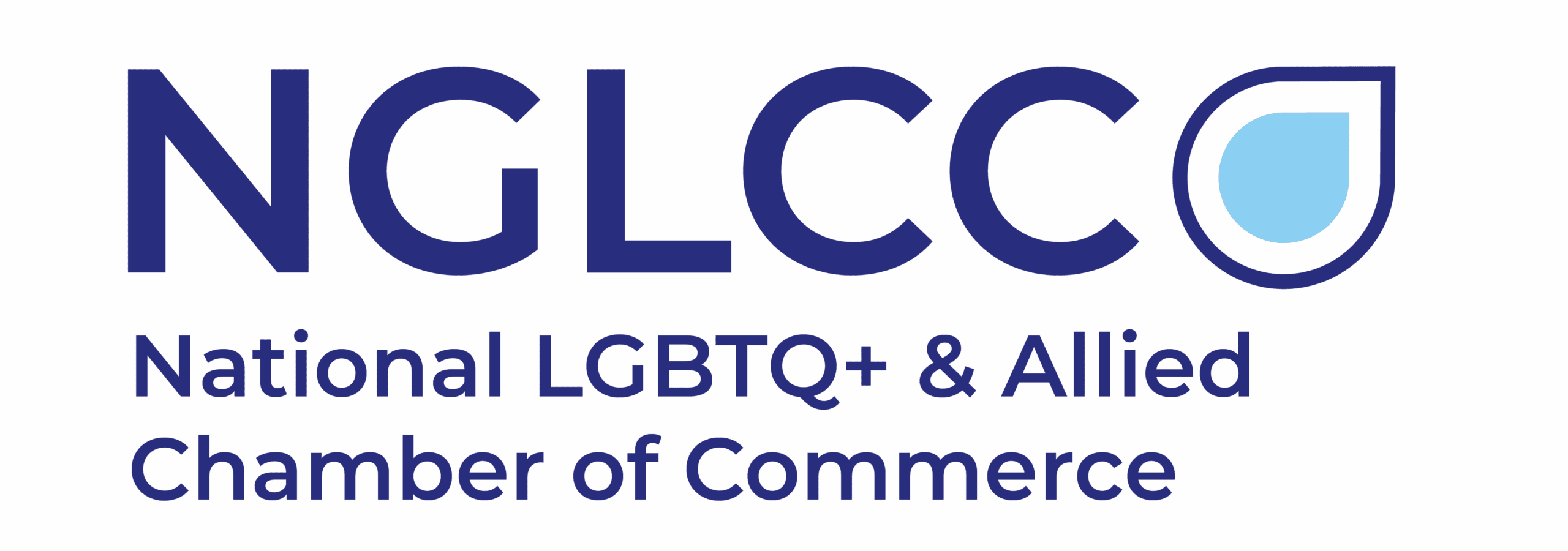
The National LGBT Chamber of Commerce (NGLCC)’s Sip & Pitch program brings together LGBT business leaders from all over the nation to pitch their businesses and create new connections. Participants informally present their business to a panel of experts and fellow business owners for positive, constructive feedback and new ideas. This week, for the first time ever, the program took on a new spin as the LGBT Sip & Pitch: Affiliate Edition! This event gave affiliate chambers a chance to present on their efforts and programs aimed at supporting the LGBT business community across the country.
Jason Rae, Vice President of Affiliate Relations at NGLCC, moderated the program. He first introduced Justin Nelson, Co-Founder & President of NGLCC.
“To all of you that are tuning in today, thanks for taking time to see what’s happening across the country in our communities with the leadership of our local affiliates,” said Nelson. “Without the leadership and passion of these chambers, NGLCC would not be able to effectively promote the LGBT business community. We are proud to shine a spotlight on these outstanding local organizations for their vital role in the national LGBT business ecosystem.”
Rae then introduced the panel of judges. The judges included Jasmine Johnson, Diversity Programs Director at Manpower Group; Brian Hall, Supplier Diversity & Brand Advocacy and Small Business Liaison Officer at Shell; and Dawn Ackerman, NGLCC ACC Western Region Co-Chair and President & CEO of OutSmart Office Solutions. All presenters had 10 minutes to pitch, with all feedback shared after in the spirit of collaboration.
The first presenter was the Texas LGBTQ Chambers of Commerce, which is a coalition comprised of several LGBT chambers in the state of Texas. Tony Vedda, President & CEO of the North Texas LGBT Chamber of Commerce, began the presentation with a description of the coalition and their goals. The Texas LGBTQ Chambers of Commerce represents over 1,000 LGBTQ-owned businesses in the state, and strategically focuses on five main areas: advocacy, visibility, statewide networks, sustainability, and building capacity.
Tina Cannon, President & CEO of the Austin LGBT Chamber of Commerce, followed her colleague by discussing the Chambers’ first “Day at the Capitol” event held in 2019, where statewide policy positions on LGBT inclusion were discussed and crafted.
“We were present and at the table, and we were recognized for our efforts as such by the House of Representatives at the end of the session,” she said.
Melissa Ochoa, Board President of the San Antonio LGBT Chamber of Commerce, then explained how the pandemic served as an opportunity to engage virtually across chambers, enabling the coalition to connect LGBTQ+ entrepreneurs throughout the state of Texas with multiple online events. This aligned with the goals for the Chambers that were laid out by Tammi Wallace, the Co-Founder and President & CEO of the Greater Houston LGBT Chamber of Commerce. Some of these goal included increasing the number of LGBTBEs in Texas and connecting them with each other, disseminating opportunities for them across chambers, including LGBTBE certification in Texas government, and raising the general visibility of LGBTBEs to highlight the contributions of LGBTQ+ businesses to the state’s economy.
Following their joint presentation, the panelists all offered their comments and feedback.
“I think it’s fantastic that all of you have decided to do this together,” Ackerman commented on chamber unity throughout the state.
Johnson agreed, stating that there was power in numbers. She asked the presenters several questions about having a joint advocacy day in the future and what a single point of advocacy or policy may be that could unite all of their supporters and members. Similarly, Hall had questions for the Chambers on what their legislative target might be in five years from now. He concurred with his fellow panelists on the spirit of collaboration.
“Collaboration is a challenge for most…you have chosen a moment in time where this is a leadership behavior and I want to commend you on that,” he said.
The second and final presenter of the day was Amanda Cole of Plexus: LGBT & Allied Chamber of Commerce. Founded in 2006, the Chamber is based in Cleveland and serves LGBT entrepreneurs throughout Northeast Ohio. Cole began her presentation with a powerful description of the dangers that come with living as a member of a marginalized community in Cleveland, as the city leads in reported transphobic murders and violence against Black women. Plexus is intended to serve as a safe space and resource for members of the LGBTQ+ community in this sense.
One barrier to entry for the Chamber that Cole identified was identification as a professional or business owner.
“How are we engaging with those who have yet to establish a career?” she asked.
Plexus, she said, has the connections and resources to help close the economic and employment gap that exists between the LGBTQ+ community and heterosexual, cisgender-identified individuals. Because of this, the Chamber seeks to partner with the local LGBT center to lead trainings focused on workforce development and digital literacy. This would function to increase accessibility to the Chamber’s programs, as well as helping them to stay true to their mission. Future partnerships could include a legal clinic with Equality Ohio, or collaborations with apparel companies to provide workforce attire to TGNC employees. They would also provide social media training and essential skill development resources to participants.
“We have to have a commitment to being accessible, to working for inclusion, and to increasing diversity,” concluded Cole.
Ackerman asked whether members were involved in the process that Cole described, which she confirmed. Members would be involved in presenting and teaching curriculum to participants, as well as helping with professional development, including resume building.
Hall questioned what measurements were in use to define improvements or positive effects that would occur as a result of the implementation of this program. Cole cited pre- and post-interviews, as well as employment statistics, as several metrics to measure improvement.
Lastly, Johnson asked whether Plexus had a plan to “flip the coin” and ensure that recruiters were also practicing and championing inclusion and equality. Cole then discussed the importance of the Chamber’s employee resource group and education foundation to completing this work, as well as learning from program participants about their past employment experiences and roadblocks with recruiters.
At the end of the panel, Rae provided his closing thoughts and gave thanks to all presenters and panelists for their participation and contributions. The panelists commended each of the presenters and the ideas that they had put forth, agreeing that each of these programs could have significant national impact.
**
Click here to view the full program. Visit nglcc.org/sipandpitch for more information on upcoming programs!
